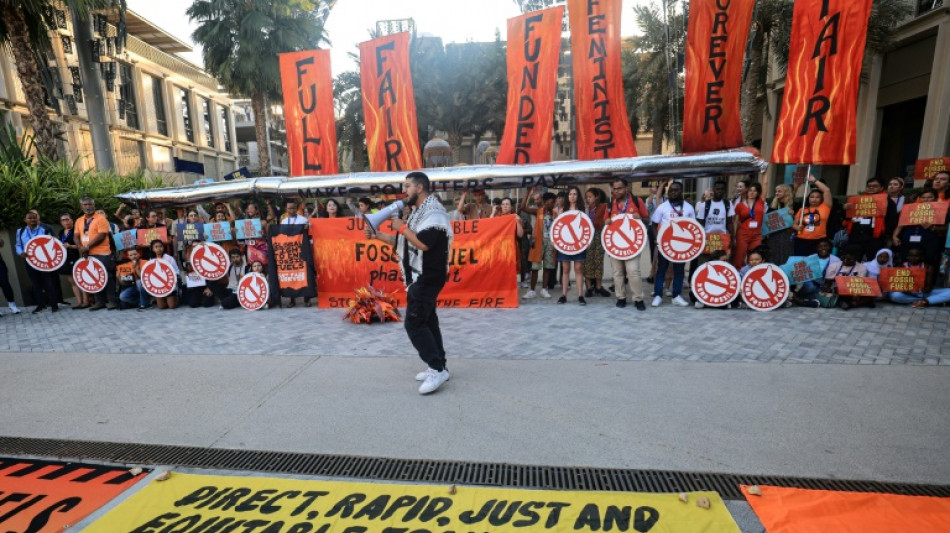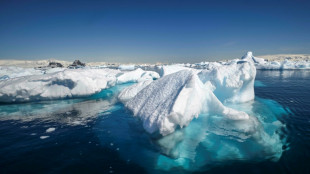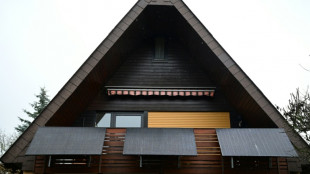

Climate negotiators eye fossil fuel compromise in marathon talks
UN climate talks went deep into overtime Wednesday with another night of negotiations aimed at breaking a deadlock between nations pushing for a historic phase-out of fossil fuels and Saudi-led oil producers.
The 13-day COP28 conference in Dubai, a glitzy metropolis built on petrodollars, has debated a first-ever global exit from fossil fuels, the main culprits in a planetary warming crisis.
COP28's Emirati president Sultan Al Jaber held meetings with top negotiators from around the world deep into the night in an effort to find consensus among nearly 200 countries.
"We are close to a deal," said a source close to the COP28 presidency as the talks, which were scheduled to end Tuesday, continued while workers began to pack up inside country pavilions.
"We're making progress," US climate envoy John Kerry said.
Australia's climate minister Chris Bowen also said "good progress" was made.
Jaber, who heads the UAE's national oil company, proposed a draft deal on Monday that fell short of mentioning a phase-out and instead suggested that nations "could" reduce consumption and production of fossil fuels, among other options.
The text was rejected by a large number of countries, including the United States, the European Union and low-lying island states most vulnerable to rising seas and tropical storms.
A text circulating on Wednesday replaces "could" with "should" and calls for "transitioning away from fossil fuels in our energy systems, beginning in this decade, in a just, orderly and equitable manner" in order to achieve net-zero emissions by 2050.
The word "phase-out" was still absent.
The UN climate office and COP28 presidency said the text was not official.
Countries were now awaiting the official draft, which was scheduled to be released at 6:00 am (0200 GMT), with a plenary session scheduled a few hours later.
After saying they would not sign a "death warrant", delegates from island states huddled inside a cavernous hall of the sprawling Expo City complex.
"We're waiting for a draft to react to," Toeolesulusulu Cedric Schuster of Samoa, chairman of the Alliance of Small Island States, told AFP.
A COP28 spokesperson said Jaber was holding "extensive consultations" to "ensure everyone is heard, and all views are considered. He is determined to deliver a version of the text that has the support of all parties."
- 'Super majority' -
More than 130 countries from Europe, the Pacific, the Caribbean and the Americas, including Brazil and the United States, have now joined forces to call for an exit from oil, gas and coal, according to a European official.
EU climate chief Wopke Hoekstra said a "super majority" of the nearly 200 countries in the talks wanted stronger action on fossil fuels.
Saudi Arabia, Kuwait and Iraq have been the most vocal opponents of a phase-out.
At an energy conference in neighbouring Qatar, Kuwaiti oil minister Saad Hamad Nasser Al Barrak called the phase-out a "racist and colonial" proposal that would wreck economies in the region.
Iraq's oil minister, Hayyan Abdul Ghani Al Sawad, said "fossil fuels will remain the major source of energy in the whole world".
Western negotiators signalled earlier that they were open to compromise language in the next draft.
Denmark's Dan Jorgensen, one of the climate ministers tasked with leading the talks, said the summit needed to be clear that fossil fuels were on their way out.
"I'm personally not married to one word," he said. "But I am insisting that the meaning of this formulation, whichever one we will end up having, has to be extremely ambitious."
The 2015 Paris summit endorsed an ambition of checking warming at 1.5 degrees Celsius -- a goal repeated in the latest draft but which critics say is virtually impossible without serious efforts to curb oil, gas and coal.
U.Kremev--LiLuX



